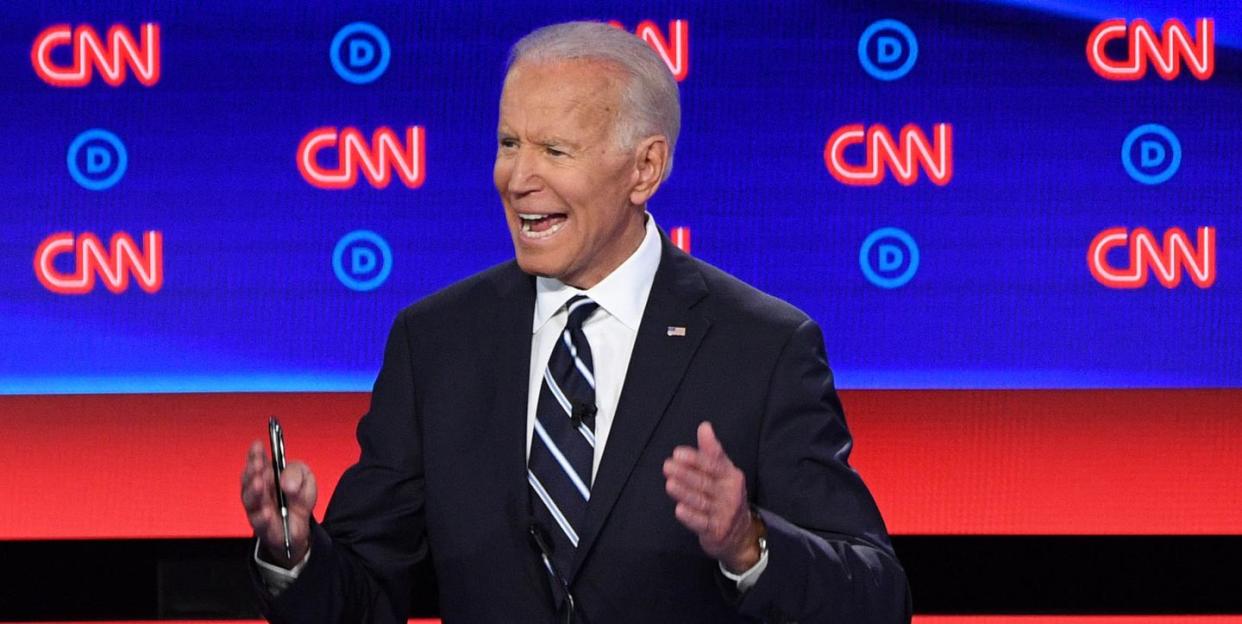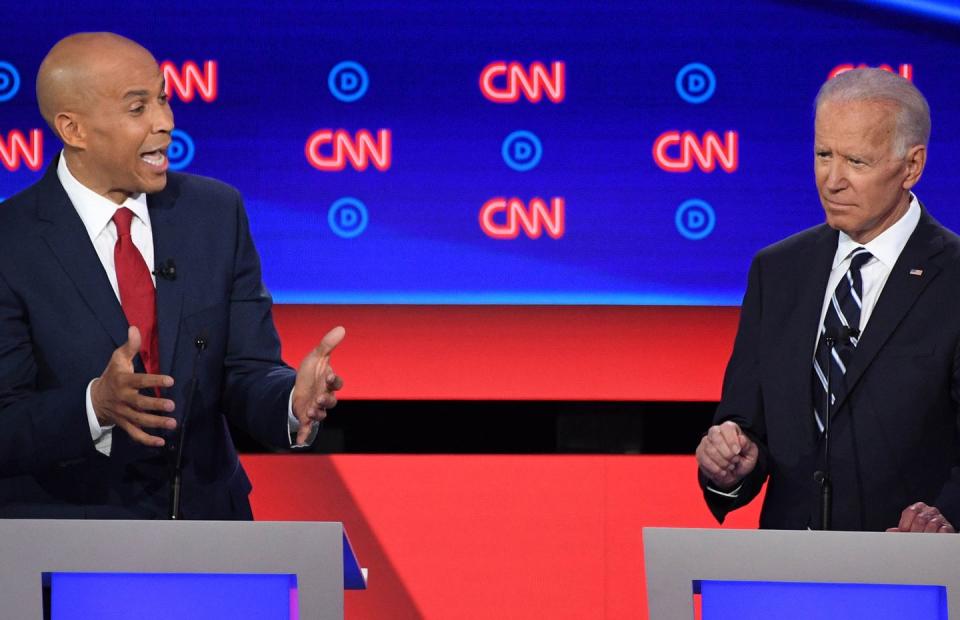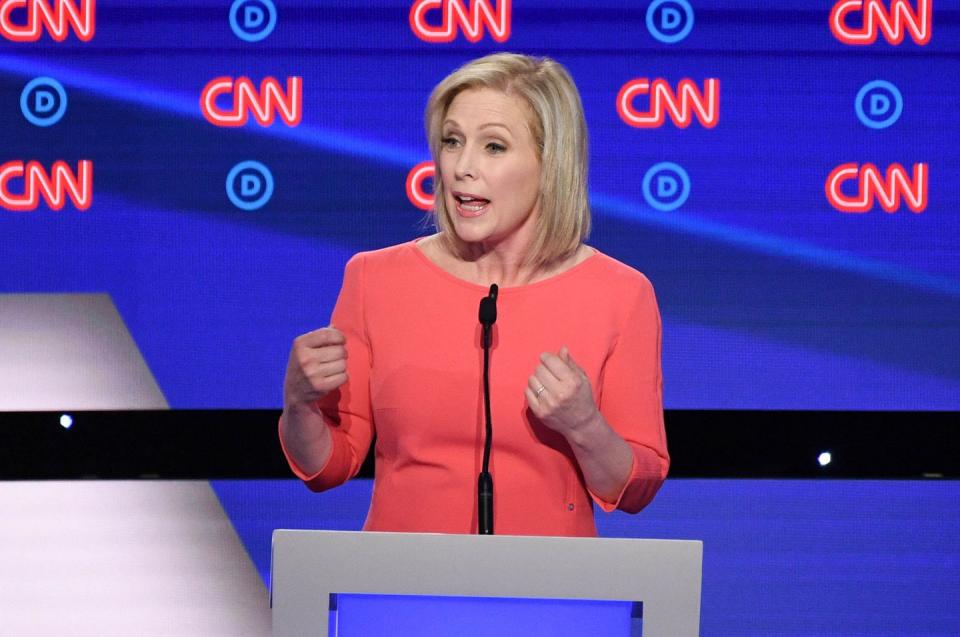Joe Biden Is the Product of a Democratic Party That Was Terrified of Ronald Reagan

DETROIT—While we're on the subject of debating the mistakes of the past in the red-hot present, Joe Biden took a lot of incoming about his lengthy career in politics on Wednesday night. Kirsten Gillibrand threw at him a perfectly awful op-ed he'd written back in 1981, which we'll get to in a moment. And Cory Booker jabbed Biden with the latter's record on criminal justice during the Clinton era, most memorably Biden's oft-repeated claim that every criminal-justice bill since, I don't know, the Hoover Administration, has had his name on it.
BOOKER: Mr. Vice President has said that, since the 1970s, every major crime bill—every crime bill, major and minor, has had his name on it. And, Sir, those are your words, not—not mine. And this is one of those instances where the house was set on fire and you claimed responsibility for those laws. And you can't just now come out with a plan to put out that fire. We have got to have far more bold action on criminal justice reform, like having true marijuana justice, which means that we legalize it on a federal level and reinvest the profits in communities that have been disproportionately targeted by marijuana enforcement.
BIDEN: The fact is that the bills that the president—that, excuse me, the future president here that the senator is talking about are bills that were passed years ago and they were passed overwhelming. Since 2007, I, for example, tried to get the crack-powder-cocaine totally—disparity totally eliminated. In 2007 you became mayor and you had a police department that was—you went out and you hired Rudy Giuliani's guy; you—and engaged in stop-and-frisk. You had 75 percent of those stops reviewed as illegal. You found yourself in a situation where three times as many African-American kids were caught in that chain and caught up. The Justice Department came after you for saying you were—you were engaging in behavior that was inappropriate, and then in fact nothing happened, the entire time you were mayor.
Number one, the bill he talks about is a bill that in my—our administration, we passed. We passed that bill that you added onto. That's the bill, in fact, you passed.
And the fact of the matter is, secondly, there was nothing done for the entire eight years he was mayor, there was nothing done to deal with the police department that was corrupt. Why did you announce on the first day a zero tolerance policy of stop and frisk and hire Rudy Giuliani's guy in 2007, when I was trying to get rid of the crack cocaine disparity?

BOOKER: Mr. Vice President, there's a saying in my community, you're dipping into the Kool-Aid and you don't even know the flavor. You need to come to the city of Newark and see the reforms that we put in place. The New Jersey head of the ACLU has said that I embraced reforms not just in action, but in deeds. Sir, you are trying to shift the view from what you created. There are people right now in prison for life for drug offenses because you stood up and used that "tough on crime" phony rhetoric that got a lot of people elected but destroyed communities like mine. This isn't about the past, sir. This is about the present right now. I believe in redemption.
Actually, much of the past two debates have been about a specific moment in the past—namely, the blasted landscape out onto which the Democratic Party looked on the morning of November 5, 1980. Ronald Reagan had crushed President Jimmy Carter, and a big part of his victory was in convincing a big piece of the white ethnic Democratic base to jump ship. Ever since then, in ways good and bad, but mostly bad, the Democratic Party has torn out its own spleen trying to find a way to get those voters back while simultaneously not reneging on the party's heroic defense of minority rights.
It was in 1981, when practically every Democrat was trying to find a way to be Republican enough to survive, that Biden wrote that horrendous op-ed to which Gillibrand referred on Tuesday night. Biden says that he simply was opposing giving a childcare tax credit to rich families—a position not dissimilar to Gillibrand's current argument against the free-college proposals being pushed by her opponents—but the language Biden used is pure Reagan-era Democratic flinch.
A recent act of Congress puts the federal government in the position, through the tax codes, of subsidizing the deterioration of the family. That is tragic.
"Deterioration of the family," in the context of the times, was a clear attempt to glom onto the forces that put Reagan in office. As the years rolled by, an entire generation of Democratic politicians grew up demanding that the party disenthrall itself from economic populism and from unqualified support of civil rights. That brought us the Democratic Leadership Council, which helped bring us two terms of President Bill Clinton.

(Jesse Jackson's campaigns in 1984 and 1988 threw over the applecart more profoundly than was appreciated at the time. They planted the seeds that sprouted decades later into the resistance politics that greeted the election of El Caudillo del Mar-a-Lago, and that represent the primary opposition to Biden, Tim Ryan, et.al. this time around.)
Part of that dynamic was an attempt by Democratic politicians to glom onto the "war" on drugs, and the "war" on crime—with which the Republicans had managed to scare those "Reagan Democrats" into voting for Poppy Bush—without completely selling out the minority voters. It was a bit of political gymnastics that proved to be impossible on a policy—and a moral—level. The 1994 crime bill signed by Clinton was the worst assault on civil liberties between Richard Nixon and the depredations of the George W. Bush administration.
It is Biden's bad luck in 2019 that he has been in politics long enough to have been part of all of this history, and that he has had to play such a central role in all the back-and-forth tacking in which the Democrats thought they had to engage in order to survive. That makes his campaign a target-rich environment for a generation of politicians who didn't come of age in a Democratic Party terrified of the specter of an almighty and transformational Ronald Reagan. History makes a fine anchor. It also makes a fine ball-and-chain.
Respond to this post on the Esquire Politics Facebook page here.
You Might Also Like

